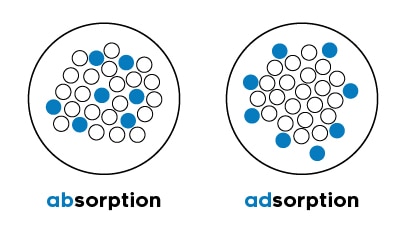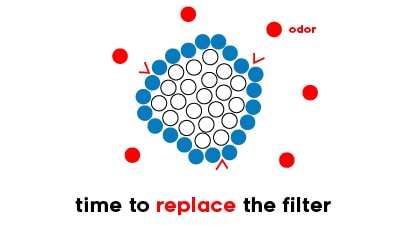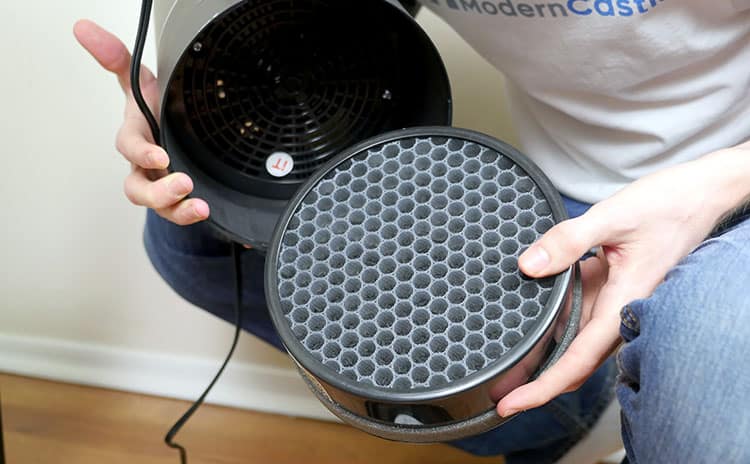Air purifiers are commonly used in homes to help disinfect and purify particles in the air. These particles may include dust, pet allergens, or air-borne illnesses—but what about odors?
Do air purifiers remove odors?

Offensive odors in your home may send you on a Google search for the best air purifiers, but do so with caution. While some air purifiers are designed to tackle pesky odors, not all purifiers are created equal.
This guide will walk you through the things you need to know to find an air purifier that can help sink the stink in your home.
Does an air purifier really remove smells?
The short answer is yes… and also no.
Let’s explain.
The main purpose of an air purifier is to remove contaminants from the air. This can include allergens, pet dander, and airborne illnesses.
Some air purifiers can help remove odors, but not all.
So what should you look for?
The answer can come in many forms, but it starts with carbon.

Air purifiers which contain some element of activated carbon may be more effective at eliminating odors. And there’s a couple ways this can be done. An air purifier may contain:
- An activated carbon filter, like in the Winix 5500-2 Air Purifier
- A cartridge with carbon granules, like in the IQAir Medical-Grade Air Purifier
Both of these methods, although taking different approaches use the same main particles and would arguably be equally as effective, when designed correctly.
What makes carbon so good at removing odors?
Carbon, whether it’s used in a fine mesh filter or as a cartridge with granules is comprised of the same basic particles—activated carbon.
Activated carbon, also known as activated charcoal, can be used to remove VOCs in your home. A VOC stands for “volatile organic compound”. These organic chemicals are often released as gas vapor from common household products, which may include offensive odors.
Carbon (or charcoal) works by a chemical process called “adsorption”. Adsorption is similar to absorption, but there are a few key differences.

Absorption vs. Adsorption
Absorption is what happens when a sponge sucks up water. It can collect water and carry it around, but it’s not bonded to the water at a molecular level.
Adsorption is similar in that when a carbon filter adsorbs foul odors or other VOCs, it can carry it around, but it’s also not bonded at a molecular level.
The difference is where the molecules sit.
In absorption, the particles are absorbed into the molecular empty space of the host (like our sponge example).
In adsorption, the particles are adsorbed to the surface of the activated carbon.

In the medical field, activated charcoal is commonly used to treat victims of drug overdose. In the case of the human body, the charcoal is able to bind with the drug particles and prevent them from further being absorbed into the body.
Activated Carbon Filters
So back to activated carbon filters.
They’re designed to allow particles to adhere to the maximum allowable surface area and whisk these VOCs and foul odors out of the air. But the surface area is limited.

When all the surface area is used up, the activated filter becomes less effective and can no longer collect harmful particles. When this happens, it’s time to change the filter so that it can start collecting particles again.
Can an air purifier remove odors without a carbon filter?
I can’t definitively say no to this, because there are constantly new and evolving technologies in the world, but activated carbon is certainly the most popular technique.
If an air purifier claims to remove odors, yet lacks the carbon filter, do your research into what other technique it might be using.
Any air purifier that effectively removes particulates floating in the air will help to reduce offensive odors, as many odors are spread by and through these air-born particulates.
How to help an air purifier remove odors
Of course, even the best air purifier may have a hard time completely removing odors without a little help.
Here are some quick tips of things you can try to help remove odors from your home.
#1. Vacuum and mop regularly
While poor air quality can certainly cause foul odors, more often than not, the floors can harbor a lot more contaminants and odors than we release.
Regular vacuuming and mopping helps to keep the stink away, especially if you have a large family or pets in the home.

RELATED: Check out our guide for the best vacuum cleaner here.
For an extra boost, consider sprinkling some baking soda into your carpet before you vacuum. You can even add in a few drops of essential oil to the baking soda before you sprinkle, which helps to capture odors and freshen the carpet.
#2. Promote good ventilation
When possible, try to promote good ventilation.
This could mean opening up a window after you cook a meal or simply turning on the fan. Ventilation enhances air flow and keeps particles moving. This will make your air purifier more effective as well as distributing any foul odors so they don’t come across so strongly.

RELATED: A good fan can help to promote ventilation. Check out our top recommendations for the best smart ceiling fans or check out our Dyson fan reviews here.
#3. Maintain clean kitchens and bathrooms
Kitchens and bathrooms are two other areas that can quickly get funky. Keeping these areas clean can help to give you a head start to a cleaner smelling home.
RELATED: Wondering where else might be hiding stick? Check out our quick read for 21 dirty spots in your home that need vacuuming.
#4. Monitor the filter of your air purifier
Whether it’s an activated carbon filter or a HEPA filter, monitoring these filters and replacing as necessary will help your air purifier to run smoothly.

The Last Word
So overall do air purifiers remove odors?
The answer, yes, some do, but it’s still not a perfect system.
In order to completely remove odors from your home it takes a level of cooperation from you and your household. Keep a clean home, promote good ventilation, and monitor the filter health of your air purifier and you’ll be well on your way to an odor-free home.
